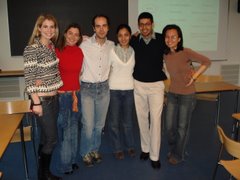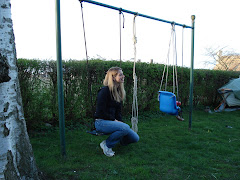(Part 3 of Kappa Kappa Denmark, Part 2 is here)
It took her about 3 years to become fully fluent in Danish. She speaks English at home with her husband, Danish with his parents, and a combination of Danish and English at work. I’ve gone to her, distressed, seeking advice on why I SUCK SO BADLY AT DANISH. If I ask my boyfriend why I suck so badly at Danish, he replies, “That’s a no-brainer. You’re lazy. You don’t practice.”
He is 100% correct. I don’t practice speaking Danish much anymore. I was committed to learning Danish my first two, two-and half-years in Denmark. Then, too many people (boyfriend included) pissed me off with their unyielding questions about why I didn’t speak Danish better, that I preemptively made the decision to not learn it (at least, that’s what my therapist Finn remarked: that I’ve “subconsciously decided to not learn Danish, for fearing of losing my Americanism”). Finn is a 70-something-year-old Dane who understands perhaps 15% of what I say, when I prattle on in English. But he has me pegged correctly! Guilty as charged.
My broken Danish has given way to too many giggles, too many “hvad siger du’s?” (what did you say?), too many “how long have you been in Denmark and you still can’t speak its?!?” that I've simply stopped trying. It sounds like I’m blaming everyone else, but I put the blame squarely on me and my hyper-sensitivities.
So, I blew the whistle and put myself on the bench. I will not play the game of Danish. And I’ll try to explain why. Here’s what Tasha and I came up with.
We are Americans (a Californian and a New Yorker). We grew up in a melting pot of mellifluous linguistic harmonies – a cheesy chorus of different dialects, accents and languages: Spanish, Russian, Polish, Mandarin, a little French here, a little German there. You can vote in a U.S. election in your choice of over 100 languages. And God Bless America for that.
I’ll give you an example of how I encounter a person in America who doesn’t speak English. Let’s take Angela, who hails from Mexico and does some work for my mom. I speak to her in a combination of Spanish, with a little English. I would never, ever, in a million years ask her why she hasn’t ‘learned English’. Such a question is beyond rude, and none of my business. So for the life of me, I can’t figure out why a Dane who I barely know asks me to my face why I’m not speaking to them in Danish. That I should know it “by now.” “That ‘it would help me so much to know it.” Not knowing that they are person #234 delivering this news.
The more I have been told that “I must learn Danish”, or that “the Key to my survival (i.e. integration into Denmark) is through Danish” the more I put on the brakes.
As Tasha explained it to me, in America, foreigners arrive at the decision (in however long time it takes them) as to whether or not learn English. They are rarely forced to learn English. A lot do learn English, eventually. And most who don’t speak a lick of English, when given the choice, would say “Sure, if I could take a pill and be fluent, that would be great!” Bottoms up.
But no one can force anyone to learn English, and becoming fluent is not a prerequisite for being granted residency in the U.S. (like it is in Denmark).
Immigrants in the U.S. are given options. Option A: Learn English, make friends, get a decent job. Option B: Don’t learn English, work in a place where you don’t need language skills (probably an unsavory job), make friends who speak your language. Option C: Learn English when you are ready, in your own time and on your own terms, adapt jobs accordingly. We’ll be here, eager to help you, no matter which option you take. The decision is squarely yours.
In Denmark I have been told by my boyfriend and key Danish advisors (not including Ditte), that I have one option: Learn Danish! Otherwise, I will not have friends, I will have a tough time keeping a decent job, and they will pound me with questions until I go crying back to where I came from.
As Tasha explained it, for rebellious, freedom-fighting “Boston-Tea-Party-loving Americans” like us, to be told that we have one, lonely option, we freeze.
As she puts it, it’s like being forced to walk down a tunnel. Where we are used to having 3 or 4 options of tunnels, there’s now only one we must cross. So we throw up our arms, and reach for the walls – building bodily barricades in the form of instructing an otherwise intelligent brain to tune out all Danish.
When I hear Danish around me now – at work, on the train, or at a cocktail party – my brain goes on vacation. I tell myself, “Take a breather now, and get back on the bench. Let them speak their Swahili, don’t concern yourself with it. You alien, you immigrant. Get another martini.”
I stumble home drunk on my own pride.
So I don’t concern myself with language any longer.
This is me, being an American, and playing by my own rules of the game. I’ve carved out another tunnel of an Option for myself. It’s not an easy channel. It has made life harder for me and more alienating in every possible way. On Tuesday I was ejected from an important meeting with a client because they wanted to conduct the meeting in Danish/Swedish. So I took the walk of shame back to my desk.
A normal person – dejected and yet provoked – would have tearfully taken out her “Learn Danish!” flashcards and gotten down to business.
I didn’t. I can’t leave the cavernous tunnel of my choosing. It was my decision to move to Denmark and to take the path less traveled.
One day I’ll arrive at the forest, fluent or not. I don’t know. But hopefully getting there on my own path and my own terms will have made some difference.













No comments:
Post a Comment